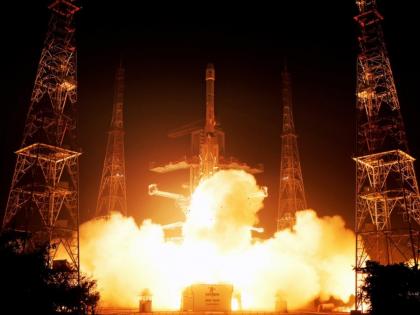ISRO Launches 100th Mission, GSLV-F15 Successfully Places Navigation Satellite NVS-02 in Orbit (Watch Video)
By Lokmat English Desk | Updated: January 29, 2025 08:07 IST2025-01-29T07:12:29+5:302025-01-29T08:07:50+5:30
The Indian Space Research Organisation (ISRO) on Wednesday, January 29, set a news milestone by successfully placing a second-generation ...

ISRO Launches 100th Mission, GSLV-F15 Successfully Places Navigation Satellite NVS-02 in Orbit (Watch Video)
The Indian Space Research Organisation (ISRO) on Wednesday, January 29, set a news milestone by successfully placing a second-generation navigation satellite in orbit. The space agency used a Geosynchronous Satellite Launch Vehicle (GSLV) in its 100th rocket launch from Sriharikota.
✅ Mission Success!
— ISRO (@isro) January 29, 2025
The GSLV-F15/NVS-02 mission has been successfully accomplished.
India reaches new heights in space navigation! 🌟 #GSLV#NAVIC#ISRO
ISRO, in an X post, said, "Mission Success! The GSLV-F15/NVS-02 mission has been successfully accomplished. India reaches new heights in space navigation!"
📸 Relive the moment! Here are stunning visuals from the GSLV-F15/NVS-02 launch.
— ISRO (@isro) January 29, 2025
A proud milestone for India’s space journey! 🌌 #GSLV#NAVIC#ISROpic.twitter.com/RK4hXuBZNN
A GSLV rocket carrying navigation satellite NVS-02 lifted off from this spaceport on Wednesday, marking ISRO's 100th mission. The mission was also the first for the space agency's Chairman, V Narayanan, who assumed office recently. It is ISRO's maiden venture this year.
GSLV-F15 Launch Video
#100thLaunch:
— Dr Jitendra Singh (@DrJitendraSingh) January 29, 2025
Congratulations @isro for achieving the landmark milestone of #100thLaunch from #Sriharikota.
It’s a privilege to be associated with the Department of Space at the historic moment of this record feat.
Team #ISRO, you have once again made India proud with… pic.twitter.com/lZp1eV4mmL
GSLV-F15/NVS-02 Mission Has Been Successfully Accomplished
As the 27.30-hour countdown concluded, the 50.9-metre tall rocket, emanating thick fumes on its tail, lifted off majestically from the second launch pad here at a prefixed time of 6.23 am on Wednesday. The Geosynchronous Satellite Launch Vehicle (GSLV-F15) follows the GSLV-F12 mission which successfully carried navigation satellite NVS-01, the first of the second generation satellites on May 29, 2023.
🚀 LIFTOFF! The GSLV-F15 has successfully taken flight, carrying NVS-02 into its planned orbit.
— ISRO (@isro) January 29, 2025
Stay tuned for more mission updates! 🌌 #GSLV#NAVIC#ISRO
The key applications of the satellite would be terrestrial, aerial and maritime navigation, precision agriculture, fleet management, location-based services in mobile devices, orbit determination for satellites, Internet-of-Things (IoT) based applications, and emergency and timing services, ISRO said.
Open in app